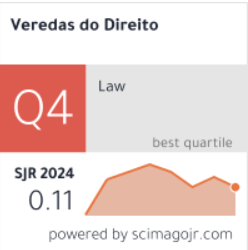KA™AHE™áº¼ GUARANI
A (DES)PROTEÇÃO JURÍDICA DA BIODIVERSIDADE E DOS ETNOSSABERES DOS POVOS INDÍGENAS BRASILEIROS
DOI:
https://doi.org/10.18623/rvd.v19i45.2412Abstract
the present study aims to investigate the legal regulation, within the Brazilian Welfare State, despite the biodiversity found in Indigenous Lands in Brazil and the access to the ethno-knowledge of Brazilian Indigenous Peoples, in the light of the case study of the ka'a he'ẽ (stevia) of the Guarani and Coca-Cola. Considering a historical matrix based on the wounds of coloniality, which rejects Indigenous Peoples to the social margin and access to their rights, it seeks to bring the general and contextual historical apparatus of Indigenous Peoples, the outline of the Democratic Social State of Brazilian Law, the legal framework that protects biodiversity and the ethno-knowledge of Indigenous Peoples, and, finally, nuances of the case study of ka'a he'ẽ (stevia) of the Guarani and Coca-Cola. Understanding that, as long as there is no social justice in Brazil, through the true implementation of all the beacons, guidelines, guarantees and rights present in the Federal Constitution, the survival of Indigenous Peoples will be threatened, and may also reverberate the historic genocide faced by these Peoples. The study starts from a decolonial theoretical foundation. The applied research follows the deductive method of approach, the descriptive and explanatory methods, at first, and, later, the exploratory method. As for the research procedures, historical, bibliographic and comparative techniques are used.
Published
How to Cite
Issue
Section
License
I (we) submit this article which is original and unpublished, of my (our) own authorship, to the evaluation of the Veredas do Direito Journal, and agree that the related copyrights will become exclusive property of the Journal, being prohibited any partial or total copy in any other part or other printed or online communication vehicle dissociated from the Veredas do Direito Journal, without the necessary and prior authorization that should be requested in writing to Editor in Chief. I (we) also declare that there is no conflict of interest between the articles theme, the author (s) and enterprises, institutions or individuals.
I (we) recognize that the Veredas do Direito Journal is licensed under a CREATIVE COMMONS LICENSE.
Licença Creative Commons Attribution 3.0








